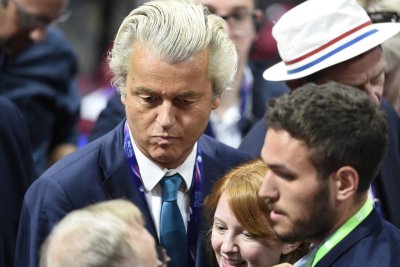Topic: Geert Wilders
Quotes
I think supporting Saudi Arabia is a bad policy and shows a double agenda
Analysis: Dutch critic of Islam warns Bush May 19, 2008
Islam's growth is the greatest threat of this century and we need to interact more on how we (the United States and the European Union) will protect traditional Christian and Jewish (territory)
Analysis: Dutch critic of Islam warns Bush May 19, 2008
It's a bad suggestion and not in Europe's security interest
Analysis: Dutch critic of Islam warns Bush May 19, 2008
The EU is about sharing certain values, and Islamic values are simply not compatible
Analysis: Dutch critic of Islam warns Bush May 19, 2008
They are still walking the streets of the Netherlands because the police can't arrest them
Religious tensions sky high in Netherlands Nov 22, 2004
Geert Wilders (Dutch pronunciation: ; born September 6, 1963 in Venlo) is an Indo-Dutch right-wing politician and leader of the Party for Freedom (Partij voor de Vrijheid – PVV), the third-largest political party in the Netherlands. He is the Parliamentary group leader of his party in the Dutch House of Representatives. In the formation in 2010 of the current Rutte cabinet, a minority cabinet of VVD and CDA, he actively participated in the negotiations, resulting in a "toleration agreement" (gedoogakkoord) between the PVV and these parties. Wilders is best known for his criticism of Islam, summing up his views by saying, "I don't hate Muslims, I hate Islam".
Raised a Roman Catholic, Wilders left the church at his coming of age. His travels to Israel as a young adult, as well as to neighbouring Arab countries, helped form his political views. Wilders worked as a speechwriter for the conservative-liberal People's Party for Freedom and Democracy (Volkspartij voor Vrijheid en Democratie – VVD), and later served as parliamentary assistant to party leader Frits Bolkestein from 1990 to 1998. He was elected to the Utrecht city council in 1996, and later to the House of Representatives. Citing irreconcilable differences over the party's position on the accession of Turkey to the European Union, he left the VVD in 2004 to form his own party, the Party for Freedom.
Wilders has campaigned to stop what he views as the "Islamisation of the Netherlands". He compares the Quran with Mein Kampf and has campaigned to have the book banned in the Netherlands. He advocates ending immigration from Muslim countries, and supports banning the construction of new mosques. Wilders was a speaker at the Facing Jihad Conference held in Jerusalem in 2008, which discussed the dangers of jihad, and has called for a hard line against what he called the "street terror" exerted by minorities in Dutch cities. His controversial 2008 film about his views on Islam, Fitna, received international attention. He has been described in the media as populist and labeled far right, though this is disputed by other observers. Wilders, who has refused to align himself with other European far-right leaders such as Jean-Marie Le Pen and Jörg Haider, views himself as a right-wing liberal and has expressed concern of being "linked with the wrong rightist fascist groups."
It uses material from the Wikipedia article "Geert Wilders."














